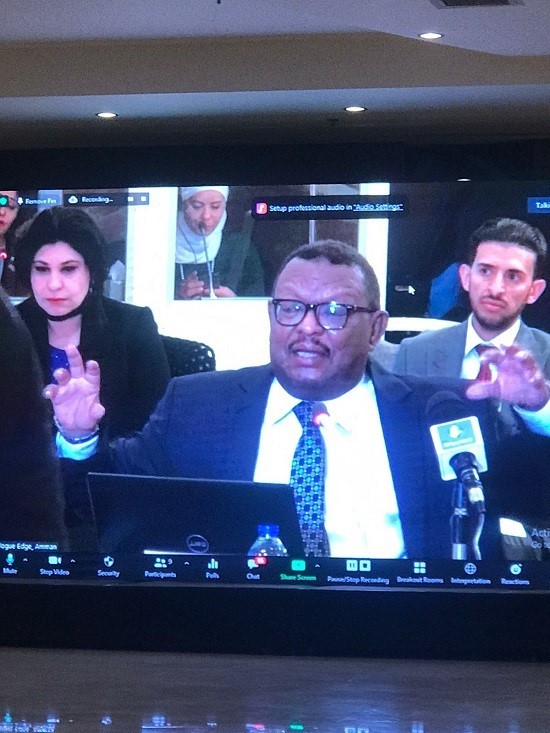AMMAN — The first day of a two-day long
conference centered around the political participation of youth in the
MENA region took place at the
Landmark Hotel in Amman on Saturday in a joint effort
by the Embassy of Norway and Al-Quds Center for Political Studies.
اضافة اعلان
Under the patronage of Jordan’s
Minister of Youth Mohammad Nabulsi, the meeting hosted the
Embassy of Norway’s Deputy Head
of Mission Rita Sandberg and other embassy officials, as well as the editor-in-chief
of Sudan’s news outlet “Elaf” Khalid Tijani.
 Editor-in-chief of Sudan’s news outlet “Elaf” Khalid Tijani speaking at the Youth Political Participation conference on January 15, 2022. (Photo: Hashem El-Sharif/Jordan News)
Editor-in-chief of Sudan’s news outlet “Elaf” Khalid Tijani speaking at the Youth Political Participation conference on January 15, 2022. (Photo: Hashem El-Sharif/Jordan News)
In opening remarks, Nabulsi said that “too often,
discussions on youth political participation outline a wide range of issues
that need solving, but end without providing a proportionate number of
solutions.” He urged attendees to articulate
their proposed solutions.
Founder of Al-Quds Center for Political
Studies,
Oraib Rantawi, asked “why do some youth avoid working with certain political
parties in their attempt to engage in politics?” giving the audience a point to
ponder.
On the sidelines of the meeting,
Jordan
News spoke with Rantawi on his views regarding Article 70 of the Jordanian
constitution (recently approved by both the Lower and Upper House), to reduce
the minimum age of candidates running for the Lower House elections from 30 to
25 years. Rantawi said he believed that
the amendment was a positive step for Jordanian youth’s engagement in political
life.
“Just because these changes now allow 25 year
old Jordanians to run for parliamentary elections does not mean that the
entirety or even most of the Lower House will be composed of 25 year olds.
These legal changes simply allow for more inclusion of our youth into the
political process, which can only be a good thing. Personally, I have been
politically active since the age 15, so the idea of a 25 year old being
politically active is not as odd as some people claim it is,” Rantawi said.
The meeting engaged in dialogue on youth
political participation in Sudan, and the participation of Iraq’s youth in
political life, starting with an overview of the political situation in each of
the two countries and followed by questions and answers with media
representatives present at the meeting.
On Sudan’s youth, participants pointed out the
pivotal role of Sudan’s youth in orchestrating recent political revolutions,
including the most recent Sudanese Revolution of December 2018, which
ultimately deposed President Omar Al-Bashir.
Experts on Zoom emphasized how many of Sudan’s
youth are preferring to engage in the political system through “resistance
committees”, as opposed to political parties, due to their flexibility and lack
of centralization.
During the discussion on
Iraq’s youth, the
head of Kulwatha Center for Studies and Measurement of Iraqi Public Opinion,
Basil Hussein stressed that Iraq’s unsuccessful effort to make its youth more
politically active is partly due to a constitutional shortfall, and partly
because the youth do not have faith in the country’s political system.
Hussein recommended to resolve Iraqi youth
abstinence from politics through a “youth quota” and lauded the role of social
media platforms as viable fora for youth political participation, noting that
many of Iraq’s recent political decisions came as a result of pressure voiced
by young Iraqis on social media outlets.
Read more National news



